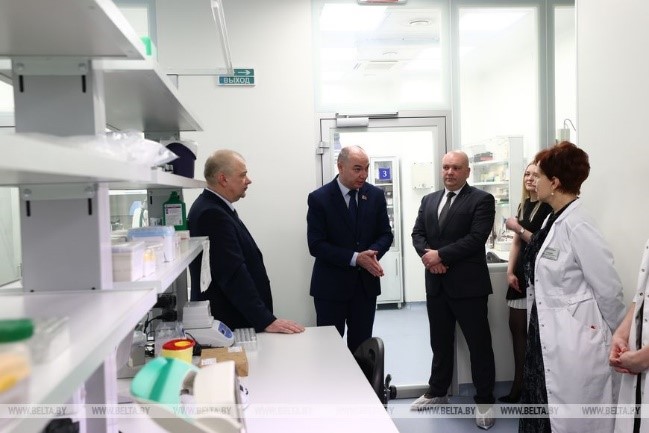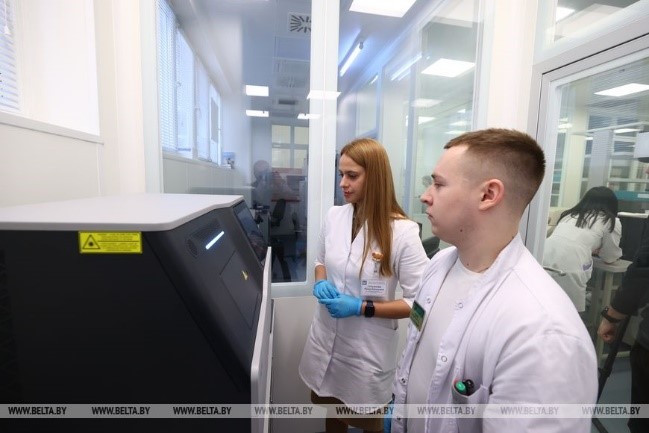Laboratory of molecular genetic research
The Laboratory of Molecular Genetic Research is a structural subdivision of the Scientific Department of the Center and has been operating since 2016.
The laboratory staff carries out scientific projects aimed at improving diagnostic and treatment methods for hereditary diseases, prenatal diagnostics of congenital immune system errors, studying the relationship between genetic prerequisites and the clinical picture of diseases, assessing the impact of the intestinal microbiome composition on the immune system, predicting the course of and response to therapy for brain tumors, and much more. The laboratory staff carries out more than 1,000 high-tech, expensive, and undoubtedly labor-intensive studies per year, the results of which are of great importance for saving children’s lives.
The main areas of scientific activity of the laboratory are:
- Diagnosis of congenital errors of the immune system using molecular genetic research.
- Development of methodological and organizational approaches for the implementation of newborn screening procedures for the early detection of congenital errors of the immune system in the Republic of Belarus.
- Development and implementation of new complex methods for diagnosing malignant tumors and soft tissues in pediatric patients.
- Genetic profiling of brain tumors to determine prognosis, adjust therapy and identify targets for targeted therapy.
- Molecular genetic diagnostics of acute lymphoblastic and myeloid leukemia, analysis of minimal residual disease.
- Evaluation of the composition of the gastrointestinal tract microflora in oncological and hematological diseases.
- Diagnosis of congenital disorders of the hemostasis system in children (hemophilia A and B, rare hereditary deficiencies of coagulation factors VII and X).
- Optimization of DNA and RNA diagnostics of oncological, hematological and immunological diseases using next-generation sequencing.
- Bioinformatics processing and analysis of data, application of statistical methods in monitoring studies.
Laboratory staff of the laboratory of molecular genetic research:
 |
Guryanova Irina Evgenievna Main research topics: congenital immune system defects, hereditary angioedema in children and adults; genetic testing methods; bioinformatics analysis of high-throughput sequencing data +375 (17) 287-10-69 |
|
Volochnik Elena Viktorovna Senior Researcher |
Research interests: molecular genetic diagnostics of acute lymphoblastic leukemia. |
|
Romantsova Alexandra Sergeevna research fellow |
Research interests: molecular genetic diagnostics of brain tumors, leukemia. |
|
Pakhomova Irina Veniaminovna research fellow |
Research interests: molecular genetic diagnostics of myelodysplastic syndromes, diagnostics of malignant tumors of soft tissues using high-throughput sequencing. |
|
Lyubushkin Alexander Vladimirovich |
Research interests: molecular genetic diagnostics of hereditary disorders of the hemostasis system and congenital errors of the immune system. |
|
Skopovets Ekaterina Yaroslavovna |
Research interests: molecular genetic determination of the composition of intestinal microbiota in various nosological forms of PID, oncological and hematological diseases. |
|
Volodashchik Tatyana Petrovna |
Research interests: molecular genetic diagnostics of congenital errors of the immune system; oncological diseases associated with primary immunodeficiencies. |
|
Vertelko Vladislav Ruslanovich Junior Researcher |
Research interests: bioinformatics data analysis, application of statistical methods in monitoring studies; creation of assembly algorithms, annotation of genomes and metagenomes |
|
Bobrik Pavel Yuryevich |
Research interests: bioinformatics data analysis; search for associative features; polymorphism analysis |
In addition to scientific activities, the laboratory also carries out clinical activities:
- molecular genetic diagnostics of congenital defects of the immune system:
- diagnostics of the most common genes associated with inborn errors of the immune system ( 51 genes ) using capillary sequencing (Sanger sequencing);
- diagnostics of the SERPING1 and FXII genes by the multiplex probe-dependent ligase reaction (MLPA) method and exon copy counting (EQT) of the SERPING1 gene;
- diagnostics of congenital errors of the immune system with damage to cellular and humoral immunity; combined immunodeficiencies associated with syndromes; with antibody defects; with defects in immune dysregulation, number and functions of phagocytes; with defects in innate immunity and autoinflammatory syndromes using high-throughput sequencing ( custom panel of 290 genes );
- diagnostics of genes of the bradykinin cascade and complement system ( custom panel of 138 genes );
- molecular genetic diagnostics of myelodysplastic syndrome (mutations in the genes RUNX1 ex3,4,5,6,7,8; SF3B1 ex13,14,15,16; U2AF1 ex2,6) and juvenile myelomonocytic leukemia (mutations in the genes PTPN11 ex3,7,8,13; Nras ex2,3; Kras ex2,3), monitoring of minimal residual disease;
- molecular genetic diagnostics of acute lymphoblastic and myeloid leukemia, analysis of minimal residual disease in leukemia;
- detection and quantification of T- and B-cell receptor gene rearrangement ring products (TREC/KREC) by multiplex quantitative real-time PCR.
In 2024, a genetic analyzer (sequencer) for whole-genome sequencing MGI DNBSEQ-G50 was purchased, allowing up to 150 GB of high-quality data to be obtained in one run (˂48 hours)

 Email:
Email:  43 Frunzenskaya st.,
43 Frunzenskaya st.,







